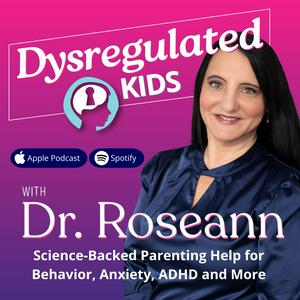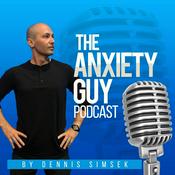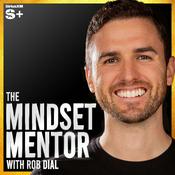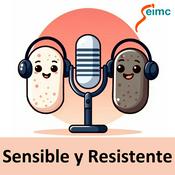Dysregulated Kids: Science-Backed Parenting Help for Behavior, Anxiety, ADHD and More
Dr. Roseann Capanna Hodge

Último episodio
380 episodios
Why So Many Kids Are Anxious, Overstimulated, and Burned Out — A Quantum Biology Explanation with Dr. Catherine Clinton | Emotional Dysregulation | E378
02/2/2026 | 40 minDiscover why so many kids are anxious, overstimulated, and burned out through a quantum biology lens with Dr. Catherine Clinton. Learn practical insights to support emotional regulation, guided by Dr. Roseann Capanna-Hodge, expert in Regulation First Parenting™ and childhood dysregulation.
So many parents feel exhausted watching their children struggle with racing thoughts, sensory overload, and anxious feelings. You’re not alone—kids today are navigating a world far more overstimulating than when we were growing up, and parental burnout is real.
In this episode, I discuss with Dr. Katherine Clinton about small, actionable steps parents can take to improve emotional regulation, sleep, and overall mental health for their children and themselves.
Why do so many kids feel burnt out and overwhelmed today?
The modern world is relentless. Screens, schedules, and constant stimulation leave young people with 30 “tabs” open in their heads. Dr. Clinton explains that quantum biology—how energy from light, sound, and electromagnetic fields impacts our bodies—helps us understand why children are more anxious and struggling with mood, focus, and sleep.
Takeaways:
Children practice self-regulation naturally when they experience stillness and boredom—a step many mental health professionals say helps prevent racing thoughts and panic attacks.
Daily physical activity outdoors supports neurotransmitters like serotonin and dopamine, helping kids focus and feel calm. This also gives parents the chance to tend to their own needs, which is essential if you want to be a better parent.
Feeling burnt out isn’t a moral failing—it’s a normal reaction to overstimulation.
Parent example: A fifth grade student who played outside daily felt calmer and less irritable compared to peers who spent all their free time on screens.
How can sleep and light affect children’s emotional health?
Sleep and circadian rhythm are foundational for regulating mood, immune function, and inflammation.
When children get enough restorative sleep, it creates a sense of stability that supports their life at home, at school, and in relationships. Poor sleep can lead to depression or other challenges that are more than just a phase—they are not a normal part of healthy development.
Morning sunlight exposure cues dopamine and serotonin, while evening red or infrared light supports mitochondrial function and restorative sleep. Overexposure to blue light at night can decrease melatonin by 90%, disrupting bedtime routines and creating racing thoughts at night.
Tips:
Go outside in natural light within 30 minutes of waking.
Reduce overhead lights and screens before bed; consider blue light blocking glasses.
Use warm, red-toned lights in the evening to cue relaxation.
Parent example: Parents who swapped overhead lights for salt lamps and dimmed screens noticed children sleeping deeper and- If every simple request turns into a power struggle, you’re not alone. How to Get Your Child to Cooperate WITHOUT a Fight reveals why cooperation starts in the nervous system—not willpower. Guided by Dr. Roseann Capanna-Hodge, founder of Regulation First Parenting™ and expert in childhood dysregulation, you’ll learn calmer, brain-based solutions that work.
If every simple request feels like a negotiation, meltdown, or power struggle, you’re not alone. This isn’t bad parenting—it’s a nervous system under pressure. When kids can’t regulate, cooperation goes offline. And once you understand that, everything changes.
In this episode, I break down the real neurological reason kids resist, why “just listen” doesn’t work, and the exact strategies that help kids of all ages—toddlers, school-age kids, and even older kids—cooperate without fights.
Why does my child say “no” to everything—even simple things like brushing teeth?
Because a dysregulated brain chooses avoidance over cooperation—every time. When your child’s nervous system is overloaded, they lose working memory, impulse control, and the ability to start tasks. Even brushing teeth or putting on socks can feel like too much, even for our own children.
This isn’t disrespect or control—it’s overwhelm. When parents shift from correcting behavior to encouraging kids through regulation, everything changes.
Key takeaways:
Behavior is communication, not defiance
A “no” often means “I can’t do this right now”
Skills don’t disappear—access to them does
Child’s cooperation grows when adults regulate first and stay on the same team
Real-Life Example
A mom I worked with felt like brushing teeth was a daily fight. Once she learned to regulate, connect, and then direct, the battles dropped—without teaching new skills. Her child finally accessed what he already knew.
How do I stop power struggles before they start?
Cooperation is a state, not a skill. You can’t demand it—you create it through co-regulation by calming the brain first.
The 3-step Regulation First approach:
Regulate first: deep pressure, a hug, walking together, slowing your voice
Connect before you direct: get close, not loud; calm presence matters
Give brain-friendly directions: short, concrete, one step
Instead of: “Get ready—we’re late!”
Try: “Shoes on.”
Connection flips the brain from threat to safety.
🗣️ “Kids don’t resist doing the thing—they resist the internal overwhelm caused by the thing.” — Dr. Roseann
You don’t have to figure this out alone.
Become a Dysregulation Insider VIP and get your FREE Regulation Rescue Kit:
How to Stay Calm When Your Child Pushes Your Buttons and Stop Oppositional Behaviors.
Head to www.drroseann.com/newsletter and start your calm parenting journey... What I See Inside Every “Defiant” Kid’s Brain Map | Emotional Dysregulation | E376
26/1/2026 | 17 minDiscover what I see inside every “defiant” kid’s brain map—revealing that oppositional behavior isn’t defiance but a dysregulated brain signaling stress. Dr. Roseann Capanna-Hodge, expert in Regulation First Parenting™, guides parents to understand, support, and calmly regulate their children’s emotions.
Parenting a defiant child can feel exhausting, confusing, and even isolating. You might wonder if their arguing, refusals, or meltdowns mean you’re failing—but you’re not alone, and it’s not bad parenting.
In this episode, I reveal what I see inside every defiant kid's brain map and explain how oppositional and defiant behavior is actually a signal of a dysregulated brain. You’ll learn how brain patterns drive defiance, why regulation must come before discipline, and practical strategies to help your child calm, focus, and thrive.
Why does my child act defiant all the time?
When parents hear “defiant,” it often triggers guilt or frustration—but defiance is never the first problem. Even behaviors that look like oppositional defiant disorder are often a sign of underlying dysregulation, not a personality flaw.
Defiant behavior is a symptom, not a personality flaw.
Children react to stress, overwhelm, or sensory input, and their behavior is simply a visible signal that their brain is struggling to cope.
Brain maps show chronic overactivation in the limbic system—the emotional center of the brain. Kids are in constant fight, flight, or freeze mode.
Example: A child who refuses homework may not be stubborn—they’re simply overwhelmed by information, sensory input, or stress.
🗣️ “Defiance really isn’t a choice, it’s a way of communicating.” — Dr. Roseann
How can brain maps help me understand my child’s behavior?
Brain mapping, or QEEG, measures electrical activity across the brain and compares it to age-appropriate norms.
Identifies overactive and underactive regions, highlighting where regulation is breaking down.
Reveals patterns behind oppositional and defiant behavior, attention deficit hyperactivity disorder, and executive functioning struggles.
Real-life scenario: Riley, a 10-year-old with extreme defiance, had hyperactive connectivity across his brain. Once his nervous system was regulated through neurofeedback and sensory support, his behavior shifted dramatically.
Tip: You don’t always need a brain map—look for the behavioral breadcrumbs. They’re screaming, “I need regulation first.”
Why can’t I just discipline or reward my defiant child?
Behavioral strategies alone often fail because they bypass the brain’s underlying dysregulation.
First step: Calm the nervous system. When the brain is regulated, skills like listening, planning, and impulse control become accessible.
Key Takeaways:
Regulation precedes consequences or teaching.
Meltdowns, shutdowns, and refusals are...The Disrespect Epidemic: Why Kids Are Ruder Than Ever and What to Do | Regulation-First Parenting | E375
21/1/2026 | 18 minKids today seem sharper, quicker to snap, and harder to parent—and it’s leaving many families exhausted. In this episode, we explore The Disrespect Epidemic: Why Kids Are Ruder Than Ever and What to Do with Dr. Roseann Capanna-Hodge, founder of Regulation First Parenting™, who reveals how emotional dysregulation—not bad parenting—drives today’s behaviors and how calming the brain restores respect.
If you feel like your child’s eye rolling, snapping, or sharp tone has gotten worse, you’re not imagining it—and you’re not failing. Many parents are quietly wondering why parenting feels harder than ever, even when they’re doing all the “right” things.
In this episode, we unpack why kids are ruder than ever and what to do, revealing why disrespectful behavior has skyrocketed and why it’s really a sign of nervous system overload—not bad manners. You’ll learn what’s driving today’s explosive reactions and how calming the brain first can restore connection, respect, and peace at home.
Why does my child seem so rude and disrespectful lately?
Many parents worry their child’s disrespectful behavior means bad manners or poor values. But it’s not disrespect—it’s dysregulation.
Children today are overstimulated, under-rested, and under constant pressure. When the nervous system is overwhelmed, skills like empathy, patience, and respectful tone go offline.
What looks like rude behavior is really a stress response. Kids don’t wake up wanting to talk back or roll their eyes—their brains are stuck in survival mode.
Takeaways:
Behavior is communication, not defiance
Overloaded brains lose access to self-control
Your child isn’t bad—their nervous system is struggling
Example: A 12-year-old snaps “Leave me alone!” when asked about homework. It’s not attitude—it’s emotional overload.
Are kids today really ruder than past generations?
Children today aren’t worse—they’re more dysregulated. Screens, constant noise, fast schedules, and emotional burnout leave little recovery time. Many young people hold it together at school, then explode at home where they feel safest.
This is why disrespectful kids often save their worst behavior for parents and family members.
Takeaways:
Kids crash at home after holding it together all day
Hyper-stimulation shortens frustration tolerance
Losing problem-solving skills makes everything feel like a threat
🗣️ “Kids don’t want to be disrespectful. It becomes the only thing their brain can do when they’re overloaded.” — Dr. Roseann
Why doesn’t my child listen or respond respectfully in the moment?
When a child’s nervous system is in fight, flight, or freeze, the prefrontal cortex—the brain’s job manager—goes offline. You can’t reason, lecture, or punish your way through dysregulation.
Matching their intensity only fuels a power struggle.
What helps instead:
Soft tone + calm...Is Over-Scheduling Hurting Your Child’s Nervous System? | Emotional Dysregulation | E374
19/1/2026 | 12 minIs your child melting down despite a full schedule? Is over-scheduling hurting your child's nervous system? This episode reveals how too much activity dysregulates kids—and how less can bring calm. Dr. Roseann Capanna-Hodge, founder of Regulation First Parenting™, shows why calming the brain restores balance.
If you’ve ever wondered why your child melts down after activities you thought were helping—or why home feels like the emotional fallout zone—you’re not alone.
In this episode, I unpack how over scheduling can quietly overwhelm a child’s nervous system, why even “good” activities can backfire, and what actually helps kids find calm, focus, and emotional balance again.
Is over scheduling hurting your child's nervous system—even with activities they love?
Many parents sign kids up with good intentions: sports, music lessons, enrichment activities. But more isn’t always better. When children go from school to after school activities to homework to bed, their nervous system never gets a break.
Key takeaways:
Transitions drain neurological energy
Even fun can be overstimulating
A constantly “on” brain can’t reset
Real-life example: A child thrives at elementary school and extracurricular activities—but explodes over socks at home. That’s not bad behavior. It’s cumulative stress.
Why does my child behave at school but fall apart at home?
This is one of the biggest clues of a child overscheduled. Home is the safe place where the nervous system finally crashes. When kids hold it together all day, the stress has to come out somewhere.
Watch for signs like:
Tears, irritability, shutdowns
Resistance to simple tasks
Physical symptoms like headaches or stomach aches
🗣️ “When kids fall apart at home but are phenomenal at school, it’s a classic sign of nervous system overload.” — Dr. Roseann
It’s not bad parenting—it’s a dysregulated brain.
Can structured activities and enrichment harm mental health?
Yes—when there’s no balance. Research shows chronic stress elevates cortisol, overloads the prefrontal cortex, and negatively impacts emotional well being, sleep, and a child’s cognitive ability.
Too many scheduled activities can lead to:
Higher anxiety and stress levels
Trouble sleeping or sacrificing sleep
Mood swings and emotional fragility
This is especially true for kids with ADHD, anxiety, OCD, PANS/PANDAS, or other mental health challenges—but all children need downtime.
If your child’s nervous system runs “hot,” tools like Quick CALM can help bring fast regulation support into daily life. Learn more at https://drroseann.com/quickcalm/.
How do I know if my child is overscheduled?
One activity alone isn’t the problem—it’s...
Más podcasts de Salud y forma física
Podcasts a la moda de Salud y forma física
Acerca de Dysregulated Kids: Science-Backed Parenting Help for Behavior, Anxiety, ADHD and More
Are you tired of the daily battles, the problems with listening and focus, meltdowns over minor frustrations, and the constant feeling of walking on eggshells in your own home? If you're a parent who feels overwhelmed, stuck in a cycle of reactivity, and utterly exhausted from trying to manage your child's challenging behaviors, you are not alone. You've tried everything—the sticker charts, the timeouts, the endless negotiations—but nothing creates lasting change.
The answer isn't more discipline. The secret is understanding the brain. Welcome to Dysregulated Kids: Science-Backed Parenting Help, the podcast that is revolutionizing the way we parent.
Hosted by Dr. Roseann Capanna-Hodge, a licensed therapist, school psychologist and author with over 30 years of experience in children's mental health and recognized by Forbes as a thought leader in children's mental health, this podcast is your lifeline. Dr. Roseann pulls back the curtain on why your child or teen is struggling, whether they have a clinical diagnosis like ADHD, Anxiety, Autism, OCD, Depression, Dyslexia, Executive Functioning challenges, Lyme, or PANS/PANDAS, or are simply navigating the ups and downs of everyday life.Her revolutionary Regulation First Parenting™ approach teaches that calming the nervous system is the first step before you can connect, teach, or help your child learn.
In short, actionable episodes, Dr. Roseann gives you proven tools like the CALMS Protocol™, quick nervous system reset tools and co-regulation strategies to move your child (and yourself!) from stress and reactivity to calm, connection, and resilience. You'll learn what to say and do to de-escalate meltdowns in the moment, how to build your child's emotional regulation skills, and how to improve their executive functioning and attention so they can succeed at home, at school, and in life.
Imagine shifting your entire perspective from seeing "defiance" to understanding "dysregulation." Picture yourself feeling confident and equipped, knowing exactly how to respond in those tough parenting moments. This is the transformation that awaits you. Parents discover how to break free from the reactivity cycle and build a more connected, joyful family—going from helpless and frustrated to empowered and hopeful.
Here's what you can expect from Dysregulated Kids:
Real Solutions for Real Problems – Whether you're dealing with ADHD, anxiety, sensory overload, meltdowns, or everyday struggles, Dr. Roseann brings strategies that actually work.
Science-Backed Parenting Tools – Learn how to understand your child's nervous system and apply research-driven calming strategies to create a peaceful, happy home.
Practical Advice You Can Use Today – Each episode delivers focused, actionable content without the fluff—just pure wisdom you can apply to your family right away.
Empowerment and Hope – Dr. Roseann blends expert knowledge with deep empathy for the challenges parents face, helping you feel confident that you can make positive change.
This podcast is for parents of the "reactive" kid or the child who feels more, reacts to little things more, and just needs more from you. It's for parents of neurodivergent children or kids struggling with mental health challenges. Really this show is for all parents dealing with typical stressors who want to raise emotionally intelligent, resilient kids in a world that is more demanding and chaotic than ever.
If you've seen Dr. Roseann on TV, you know she doesn't shy away from real talk about real problems. She brings that same authenticity and expertise to every episode, combining hope with science to help you calm the brain and create a happier family.
Are you ready to stop just surviving and start thriving? Subscribe now and start your journey toward a calmer brain and a happier family today.
For more resources, show notes, and to connect with Dr. Roseann, visit drroseann.com.
Sitio web del podcastEscucha Dysregulated Kids: Science-Backed Parenting Help for Behavior, Anxiety, ADHD and More, Durmiendo y muchos más podcasts de todo el mundo con la aplicación de radio.es

Descarga la app gratuita: radio.es
- Añadir radios y podcasts a favoritos
- Transmisión por Wi-Fi y Bluetooth
- Carplay & Android Auto compatible
- Muchas otras funciones de la app
Descarga la app gratuita: radio.es
- Añadir radios y podcasts a favoritos
- Transmisión por Wi-Fi y Bluetooth
- Carplay & Android Auto compatible
- Muchas otras funciones de la app


Dysregulated Kids: Science-Backed Parenting Help for Behavior, Anxiety, ADHD and More
Escanea el código,
Descarga la app,
Escucha.
Descarga la app,
Escucha.








































